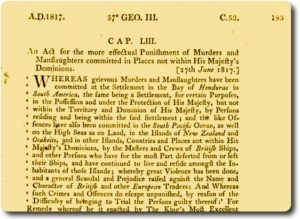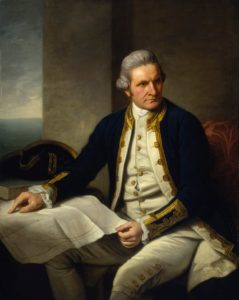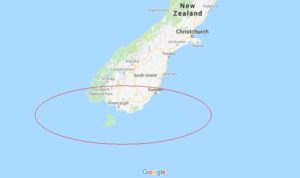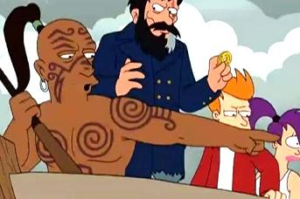1817: The Murders Abroad Act
June 27, 2020
By AHNZ
 Today in New Zealand history, 27 June, 1817, the country was first mentioned in statute. The occasion was, for one thing, to make it quite clear that New Zealand was not part of British territory. The Murders Abroad Act became law in 1817.
Today in New Zealand history, 27 June, 1817, the country was first mentioned in statute. The occasion was, for one thing, to make it quite clear that New Zealand was not part of British territory. The Murders Abroad Act became law in 1817.
 Continents Suspected Deep in the South
Continents Suspected Deep in the South
Almost 50 years before, Captain Cook had performed the sacred and legal rites betwixt the North and South Islands to claim New Zealand as British. In that special place, which he called Cook Straight, the Union Jack was raised, a bottle of coins (never been found since) was buried, wine drunk, and cooperative Maoris blessed the Captain’s doings.
British East India Company
Rather than open up New Zealand to the British, Cook’s taking possession of these islands actually shut them out. It was not what Cook or Joseph Banks had wanted, but the realm they had secured for their King were simply pocketed by the East India Company. Like some spoilt little rich girl, the EIC simply smiled for a moment at the gift then tossed it in her jewellery box with so much other expensive treasure and forgot about it.¹ Only if someone else admired or wanted New Zealand did the EIC suddenly give a jealous damn; They didn’t really want it but nobody else could have it either!
The EIC opposed any settlements within the territory of its Pacific Monopoly, including New Zealand. After all, this would be the thin end of a wedge leading to competition and the end of their hold on the region. The EIC had the exclusive right to supply New South Wales Colony and to transport convicts; This put a nasty economic choke-hold on NSW in its early days. The monopoly closed down New Zealand which might otherwise have taken a very different course of history had it been open to the Free Market.
New Zealand’s early history was not British but American and French because they didn’t have to follow the domestic monopoly regulations of the British. Strange to say, New Zealand would have been more British from the outset if Captain Cook never claimed her!
The Little Guy Gets His Chance
 Not until 1801 did the East India Company increasingly lose her grip on New Zealand, allowing the British to join the sealing and whaling action Down Under. Almost at once, Governor King, of NSW, took advantage of the loosening to send George Bass to get the produce his colony needed but the EIC was making it so hard to get. King was able to use his authority over New Zealand to grant Bass his own exclusive monopoly over the lower South Island.
Not until 1801 did the East India Company increasingly lose her grip on New Zealand, allowing the British to join the sealing and whaling action Down Under. Almost at once, Governor King, of NSW, took advantage of the loosening to send George Bass to get the produce his colony needed but the EIC was making it so hard to get. King was able to use his authority over New Zealand to grant Bass his own exclusive monopoly over the lower South Island.
 By the year 1812 the little whaling companies were trading and shipping and hunting around New Zealand, the East Indian Company’s Pacific monopoly was done. Whatever quid pro quo The Company had been giving the Crown for the territory wasn’t worth paying now, not unless the Crown was willing to send the navy to clear the seaways. That would have involved calling the whalers “pirates” and fighting a very expensive extermination war against those who loved the spice of danger and the wild rough romance of trawling Atlantis for riches.
By the year 1812 the little whaling companies were trading and shipping and hunting around New Zealand, the East Indian Company’s Pacific monopoly was done. Whatever quid pro quo The Company had been giving the Crown for the territory wasn’t worth paying now, not unless the Crown was willing to send the navy to clear the seaways. That would have involved calling the whalers “pirates” and fighting a very expensive extermination war against those who loved the spice of danger and the wild rough romance of trawling Atlantis for riches.
So it was that with The Murders Abroad Act (1817) that The Crown gave up its interests in New Zealand altogether. The only reason Governments ever want power and control over something is so they can take it away from those who create value with it and sell it back to them for a licence fee. When the first Cook Straight Settlers started creating value in New Zealand in an organised way, the Crown promptly appeared as well like ants following a picnic.
“AH! Those good old times, when first I came to New Zealand, we shall never see their like again…before Governors were invented, and law, and justice, and all that. When everyone did as he liked- except when his neighbours would not let him…no taxes, or duties, or public works, or public to require them..Money was useless and might go a begging.”- Old New Zealand (1863); Frederick Maning
 For the years between the NSW Annex of New Zealand (1840) and the Murderers Abroad Act (1817) there is a wonderful anarchic history of little settlements seldom told. New Zealand was not quiet during this time at all, despite the history revisionist pretence that our history started in 1840. Or, that non-Maori couldn’t or didn’t come here in droves until the ‘Waitangi Covenant‘ opened the gates to them; Ridiculous!
For the years between the NSW Annex of New Zealand (1840) and the Murderers Abroad Act (1817) there is a wonderful anarchic history of little settlements seldom told. New Zealand was not quiet during this time at all, despite the history revisionist pretence that our history started in 1840. Or, that non-Maori couldn’t or didn’t come here in droves until the ‘Waitangi Covenant‘ opened the gates to them; Ridiculous!
The Government did not create New Zealand’s towns or settlements or culture or way of life; It simply came along after the fact to take them over and claim credit. The Murders Abroad Act is a wonderful founding document for the true New Zealand. It’s not an Act of taking over or infestation, it’s an Act of the State going away and leaving New Zealand alone. It’s a constitutional founding document of our laissez-faire national identity. No wonder you wouldn’t have heard of it and will not read of it in Government history books.
—
1 Likewise, the area the explorers admired so much that they named it after the exquisite science of botany itself, Botany Bay, became, in the hands of the state, a bloody great prison! Moral lesson: Don’t give things to the Government if you care about what happens to them
Ref. Murders Abroad Act 1817; Wiki
 Like Comment Share
Like Comment Share





